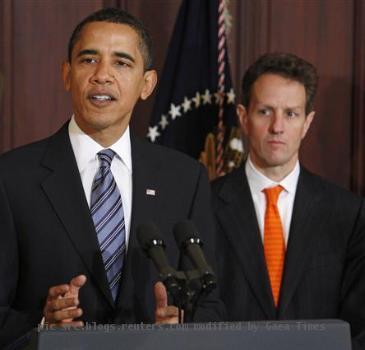Tensions emerge with independent lawmaker over Australian government plan to proceed with tax
By Rod Mcguirk, APTuesday, September 7, 2010
Australian gov’t plans to continue with mining tax
CANBERRA, Australia — The first full day of Australia’s new minority government revealed tensions Wednesday between the deputy prime minister and a kingmaker independent legislator over plans to make mining companies pay more tax.
The disagreement between Deputy Prime Minister Wayne Swan and Tony Windsor underscores the fragility of the center-left Labor Party administration that could be brought down by a single lawmaker defecting.
U.S. President Barack Obama congratulated Prime Minister Julia Gillard on her election in a telephone conversation in which he relayed his personal commitment to the relationship between the U.S. and Australia, a statement released by the White House press secretary said.
Gillard left Canberra to attend the funeral of an Australian soldier killed in Afghanistan but was expected to return as early as Thursday to name her Cabinet.
The Cabinet will include Kevin Rudd, the prime minister whom Gillard ousted in an internal party mutiny in June, and might include independent Rob Oakeshott. Oakeshott has yet to accept the Cabinet job offer.
As part of a deal to get Windsor and Oakeshott to throw their support behind a Labor government on Tuesday, Gillard and Swan promised to hold a public summit of tax experts by June 30 next year to discuss options for tax reforms recommended last year in a Treasury department report.
But Swan surprised Windsor by saying that Labor’s plan to impose a new 30 percent tax on iron ore and coal miners’ profits, which are burgeoning with the voracious demand for raw materials from Chinese and Indian manufacturers, will not be submitted for review at the summit.
Swan said some of the 10.5 billion Australian dollars ($9.6 billion) to be raised from the tax over two years was needed to pay for other sweeteners offered to Windsor and Oakeshott, including AU$10 billion for upgrading rural schools, hospitals and other infrastructure outside major cities.
“There are going to be vigorous debates and the mining tax is one where we do disagree,” Swan told reporters.
Swan said he hoped to introduce the mining tax legislation in Parliament as soon as possible.
Windsor said he understood that the mining tax plan would be scrutinized at the tax summit and would talk to Swan about having it included.
“I thought it was going to be included in any discussions in relation to taxation” and the Treasury report, Windsor told Australian Broadcasting Corp. radio on Wednesday.
Windsor and Oakeshott could not immediately be contacted by The Associated Press for comment Wednesday.
The Australian Chamber of Commerce and Industry chief executive Peter Anderson, a leading business advocate, urged the pair not to support the tax in the form proposed by Swan.
But Sen. Bob Brown, leader of the Greens party whose nine senators will be able to ensure that Labor legislation is passed by the upper chamber of Parliament, said he supported the legislation even if it were not reviewed by the tax summit.
Opposition leader Tony Abbott, whose conservative coalition could have formed a minority government with Windsor and Oakeshott’s support, has refused to back the mining tax because Abbott argues it would reduce investment in the mining industry and cost jobs.
Opposition finance spokesman Andrew Robb on Tuesday attempted to prevent the pair from siding with Labor by citing a report from mining information firm Intierra Resource Intelligence that found that revenue for the mining tax could be AU$8 billion less than the government forecast.
“There’s an AU$8 billion dollar gaping hole in the government’s mining tax and in its budget and this will cause major problems again with more borrowings, more reckless spending and a Julia Gillard government, if it is returned today, will mean more incompetence and more debt for Australians to meet,” Robb told ABC radio on Tuesday.
Labor was returned to govern for a second three-year term on Tuesday, after 17 days of intense negotiations since an Aug. 21 election failed to give any party a clear majority for the first time in 70 years.
Tags: Australia, Australia And Oceania, Barack Obama, Canberra, Energy, Government Regulations, Industry Regulation, Materials, North America, United States



